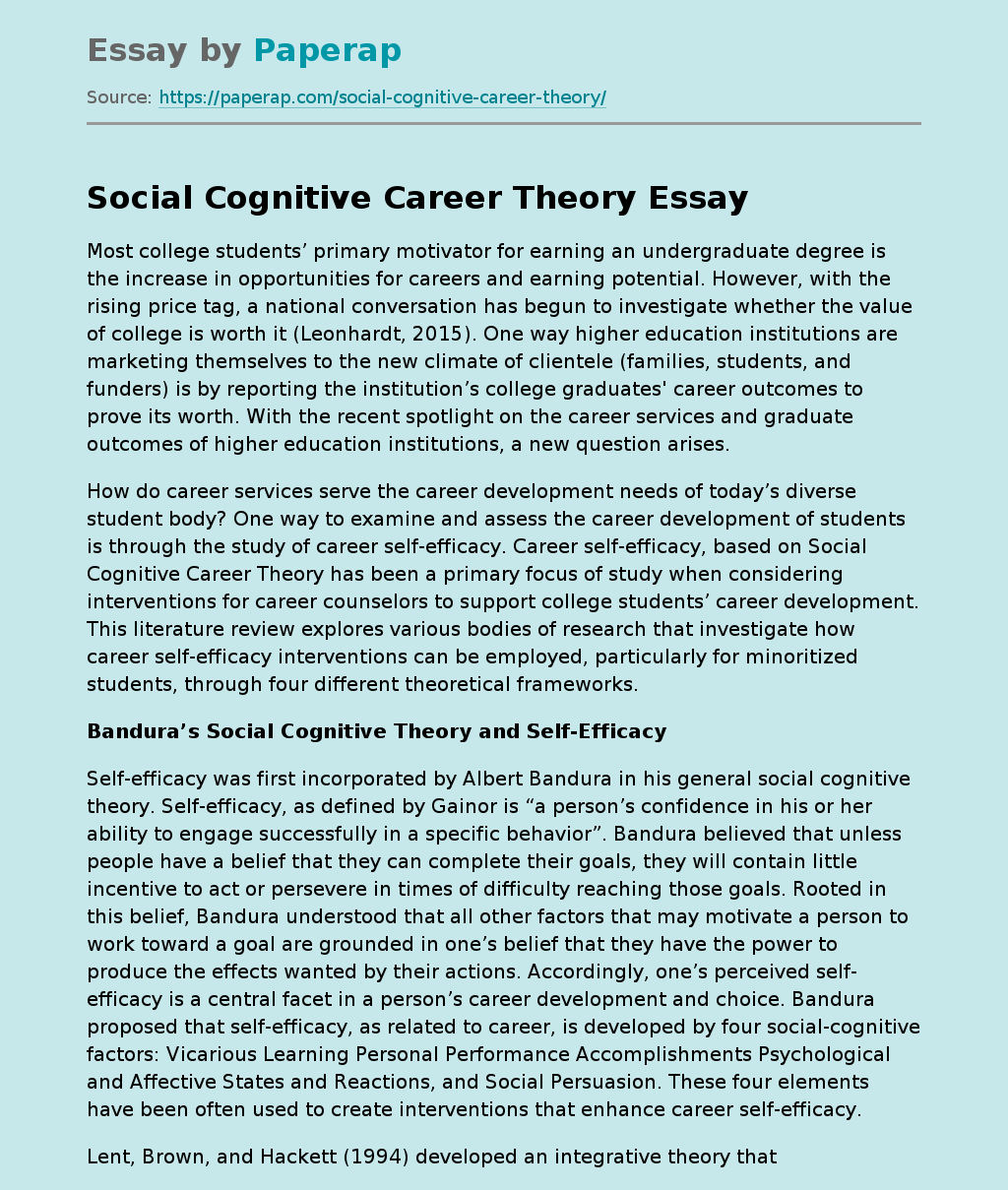Social Cognitive Career Theory
Most college students’ primary motivator for earning an undergraduate degree is the increase in opportunities for careers and earning potential. However, with the rising price tag, a national conversation has begun to investigate whether the value of college is worth it (Leonhardt, 2015). One way higher education institutions are marketing themselves to the new climate of clientele (families, students, and funders) is by reporting the institution’s college graduates’ career outcomes to prove its worth. With the recent spotlight on the career services and graduate outcomes of higher education institutions, a new question arises.
How do career services serve the career development needs of today’s diverse student body? One way to examine and assess the career development of students is through the study of career self-efficacy. Career self-efficacy, based on Social Cognitive Career Theory has been a primary focus of study when considering interventions for career counselors to support college students’ career development. This literature review explores various bodies of research that investigate how career self-efficacy interventions can be employed, particularly for minoritized students, through four different theoretical frameworks.
Bandura’s Social Cognitive Theory and Self-Efficacy
Self-efficacy was first incorporated by Albert Bandura in his general social cognitive theory. Self-efficacy, as defined by Gainor is “a person’s confidence in his or her ability to engage successfully in a specific behavior”. Bandura believed that unless people have a belief that they can complete their goals, they will contain little incentive to act or persevere in times of difficulty reaching those goals.
Rooted in this belief, Bandura understood that all other factors that may motivate a person to work toward a goal are grounded in one’s belief that they have the power to produce the effects wanted by their actions. Accordingly, one’s perceived self-efficacy is a central facet in a person’s career development and choice. Bandura proposed that self-efficacy, as related to career, is developed by four social-cognitive factors: Vicarious Learning Personal Performance Accomplishments Psychological and Affective States and Reactions, and Social Persuasion. These four elements have been often used to create interventions that enhance career self-efficacy.
Lent, Brown, and Hackett (1994) developed an integrative theory that unifies elements of Bandura’s self-efficacy theory within a social cognitive theory framework and additional career theories into an expanded and updated social cognitive theory, Social Cognitive Career Theory (SCCT). This theory aims to connect the links between self-efficacy and career development. SCCT explicitly examines the role of the environment and other contextual variables in its understanding of career development. Self-efficacy, outcome expectations, and goals are the building blocks of SCCT that help explain how academic and career interests form, how educational choices are made, and how academic and career success is obtained.
SCCT also understands self-efficacy as an impactful agent for both motivations of behavior and behavior change. This theory, with its framework in Bandura’s social cognitive theory, explains that throughout their childhood people are exposed to various activities and potential career paths that are reinforced by their different environments. Repeated engagement through modeling and feedback from important people in a person’s life refine a person’s career skills and interests. As one acquires certain expectations about their performance outcomes, these expectations translate to one’s self-efficacy and create the formation of interests. This framework clarifies how self-efficacy predicts a person’s career path choice.
Social Cognitive Career Theory. (2021, Dec 10). Retrieved from https://paperap.com/social-cognitive-career-theory/

